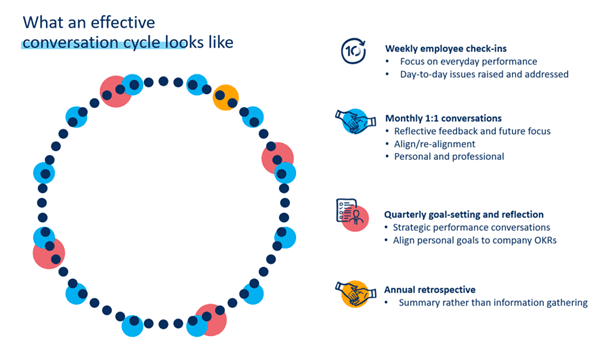An effective performance management process involves a conversation cycle formed by a series of meetings and check-ins between a manager and employee that plans, monitors, and reviews the employee’s objectives, long-term goals, and overall impact on the company.
While it is often thought of as an annual or bi-annual performance review delivered from management to an employee, performance management is at its most effective when it is performed throughout the year in a collaborative manner.
Continuous Performance Management.
Here at Zensai we know the conversation cycle as a process of Continuous Performance Management.

How exactly it’s done depends on your organisation, but this is a good template to follow:
- Weekly check-ins
Engage in brief weekly check-ins to discuss progress, achievements, and challenges. These regular interactions are a fundamental part of the conversation cycle and allow for timely feedback and course corrections, ensuring that goals stay on track and issues are tackled early.
With Engage365 these are done through a digital, written check-in via Microsoft Teams or web.
- Monthly 1:1s
Conduct more in-depth monthly 1:1s to assess overall progress, discuss development opportunities, and address any emerging issues. This allows for a broader perspective on performance trends. Best done face-to-face or as a video call.
- Quarterly Reviews
Every quarter, evaluate performance against set goals and provide comprehensive feedback. Use this time to discuss longer-term objectives and adjust strategies as needed.
- End-of-year reviews
When the year comes to a close, conduct thorough end-of-year reviews. Celebrate achievements, discuss areas for improvement, and set the stage for the upcoming year’s performance goals.
- Project milestones:
Performance management should also be integrated into project milestones. Regularly evaluate how contributions are aligning with project objectives and provide feedback accordingly.
- Ad-hoc checkpoints
Beyond scheduled meetings, be prepared for ad-hoc discussions as needed. Performance management should be adaptable to address urgent matters or changes in goals. Managers need to build trust and rapport with their teams, so employees feel comfortable raising points as required.
Ultimately, performance management should be a seamless part of your work routine, seamlessly integrated into daily, weekly, and monthly interactions. It’s not a one-off event but an ongoing commitment to growth, excellence, and continuous improvement.
What are the differences between 1:1s and performance reviews in the conversation cycle?
1:1s (one-on/to-ones) and performance reviews serve distinct purposes within the context of employee management and development. While they both involve discussions between managers and employees, they differ in their frequency, focus, and objectives.
Here are the key differences between 1:1s and performance reviews:
Frequency:
- 1:1s: These are regular, ongoing meetings between a manager and an employee. They typically occur monthly or bi-monthly, depending on the organisation’s culture and preferences.
- Performance Reviews: Performance reviews usually happen annually or semi-annually, providing a more comprehensive evaluation of an employee’s overall performance over a longer period.
Focus:
- 1:1s: The focus of 1:1s is on current and near-term work. These meetings are an opportunity to discuss ongoing projects, goals, challenges, and provide real-time feedback.
- Performance Reviews: Performance reviews have a broader focus, covering the employee’s achievements, strengths, areas for improvement, and alignment with long-term goals and company objectives.
Nature of Discussion:
- 1:1s: 1:1s often involve open and informal discussions. They are a platform for employees to share progress, ask questions, seek guidance, and address immediate concerns.
- Performance Reviews: Performance reviews are typically more structured and formal. They involve a comprehensive assessment of the employee’s performance against established goals and competencies.
Feedback in the Conversation Cycle:
- 1:1s: 1:1s offer ongoing feedback and coaching, allowing managers to provide timely guidance, suggestions, and support to help employees succeed in their roles.
- Performance Reviews: While performance reviews also include feedback, they tend to focus on summarizing performance over a specific period, discussing achievements, areas for growth, and development opportunities.
Goal setting:
- 1:1s: Managers and employees collaboratively set and adjust short-term goals during 1:1s. These goals are often aligned with the team’s current projects and priorities.
- Performance Reviews: Performance reviews may include discussions about progress towards long-term goals and the establishment of new objectives for the upcoming performance period.
Relationship Building:
- 1:1s: Regular 1:1s contribute to building a strong working relationship between managers and employees. These meetings foster trust, open communication, and a sense of support.
- Performance Reviews: Performance reviews are a formal opportunity for managers to acknowledge an employee’s contributions, discuss career development, and also offer guidance for advancement.
Continuous Improvement:
- 1:1s: 1:1s are a continuous improvement mechanism, providing a platform for ongoing feedback and adjustment of goals to ensure optimal performance.
- Performance Reviews: Performance reviews contribute to overall performance improvement by assessing progress, identifying areas for development, and establishing strategies for growth.
Connotations:
- 1:1s: Typically, employees see a 1:1 as an informal chat with their manager and an opportunity to get some support, input or advice.
- Performance reviews: employees view them as much bigger events and these are more likely to spark a degree of anxiety in an employee.
In essence, 1:1s and performance reviews serve complementary roles in the conversation cycle.
1:1s focus on day-to-day progress, support, and feedback, while performance reviews offer a more comprehensive evaluation of an employee’s performance and development over a defined period.
Both interactions contribute to employee growth, engagement, and success within the organisation.
Performance Management and Conversation Cycles
Remember, a great performance review isn’t a singular event; instead, it’s the culmination of an ongoing, positive journey. Imagine shifting your focus from an annual assessment to a culture of continuous development. Then, a conversation cycle with regular meaningful conversations, clear goal-setting, and targeted feedback becomes the cornerstones of this journey.
Additionally, this transformative approach fosters a sense of ownership and motivation, empowering your employees to reach their full potential.









